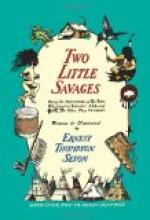To carry out his plan he must work hard at school, for books had much that he needed. Perhaps some day he might get a chance to see Audubon’s drawings, and so have all his bird worries settled by a single book.
That summer a new boy at school added to Yan’s savage equipment. This boy was neither good nor bright; he was a dunce, and had been expelled from a boarding school for misconduct, but he had a number of schoolboy accomplishments that gave him a tinge of passing glory. He could tie a lot of curious knots in a string. He could make a wonderful birdy warble, and he spoke a language that he called Tutnee. Yan was interested in all, but especially the last. He teased and bribed till he was admitted to the secret. It consisted in spelling every word, leaving the five vowels as they are, but doubling each consonant and putting a “u” between. Thus “b” became “bub,” “d” “dud,” “m” “mum,” and so forth, except that “c” was “suk,” “h” “hash,” “x” “zux,” and “w” “wak.”
The sample given by the new boy, “sus-hash-u-tut u-pup yak-o-u-rur mum-o-u-tut-hash,” was said to be a mode of enjoining silence.
This language was “awful useful,” the new boy said, to keep the other fellows from knowing what you were saying, which it certainly did. Yan practised hard at it and within a few weeks was an adept. He could handle the uncouth sentences better than his teacher, and he was singularly successful in throwing in accents and guttural tones that imparted a delightfully savage flavour, and he rejoiced in jabbering away to the new boy in the presence of others so that he might bask in the mystified look on the faces of those who were not skilled in the tongue of the Tutnees.
He made himself a bow and arrows. They were badly made and he could hit nothing with them, but he felt so like an Indian when he drew the arrow to its head, that it was another pleasure.
He made a number of arrows with hoop-iron heads, these he could file at home in the woodshed. The heads were jagged and barbed and double-barbed. These arrows were frightful-looking things. They seemed positively devilish in their ferocity, and were proportionately gratifying. These he called his “war arrows,” and would send one into a tree and watch it shiver, then grunt “Ugh, heap good,” and rejoice in the squirming of the imaginary foe he had pierced.
He found a piece of sheepskin and made of it a pair of very poor moccasins. He ground an old castaway putty knife into a scalping knife; the notch in it for breaking glass was an annoying defect until he remembered that some Indians decorate their weapons with a notch for each enemy it has killed, and this, therefore, might do duty as a kill-tally. He made a sheath for the knife out of scraps of leather left off the moccasins. Some water-colours, acquired by a school swap, and a bit of broken mirror held in a split stick, were necessary parts of his Indian toilet. His face during the process of make-up was always a battle-ground between the horriblest Indian scowl and a grin of delight at his success in diabolizing his visage with the paints. Then with painted face and a feather in his hair he would proudly range the woods in his little kingdom and store up every scrap of woodlore he could find, invent or learn from his schoolmates.




